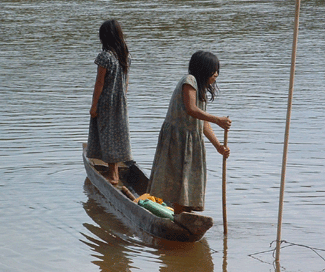Plants and child health in the Bolivian Amazon

Local ethnobotanical knowledge is important for health and nutrition, particularly in rural low-resource settings. This prospective study investigates the association between parental ethnobotanical knowledge and child health among the Tsimane', a horticulturalist and foraging society in Amazonian Bolivia. Tsimane' use local plants daily for medicine, firewood, construction and food.
The study evaluated the health of 330 Tsimane' two-to-ten year-olds and interviewed their mothers and fathers to assess their ethnobotanical skills and knowledge. Researchers looked at three measures of child health: their immune function, as measured in C-reactive protein levels; skinfold thickness, to estimate fat stores, and height-for-age, to assess stunted growth. Mothers who had knowledge of local plants well above the average were more likely to have children with better health, whereas mothers who had less than the average knowledge were more likely to have children with worse indicators of health and nutrition.
The association was robust to the three measures of growth, nutritional status, and immune function, and to a wide range of potentially confounding variables, such as distance to a water sources, or presence of traditional healers in the village. The results highlight the importance of ethnobotanical knowledge for indigenous peoples, probably because is a form of adaptation to the environment. These results underscore the importance of local cultural factors to child health and document a potential cost if ethnobotanical knowledge is lost.
References
"Ethnobotanical knowledge is associated with indices of child health in the Bolivian Amazon" .T. W. McDade, V. Reyes-García, P. Blackinton, S. Tanner, T. Huanca, and W. R. Leonard. PNAS 2007;104;6134-6139; originally published online Mar 26, 2007.

